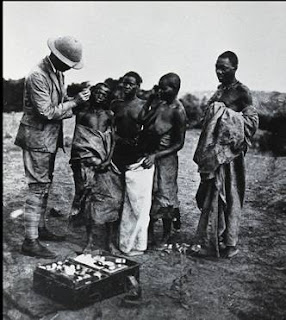Reading Questions for AFRICANS, Chapter 10:
Economic Change
- What was the major consequence of Africa's colonial period?
- What's a lorry, and what effects did it have?
- What trades grew and which ones collapsed?
- How did agriculture change in this period?
- What were the impediments to capitalism? (p. 224)
- What happened with European agriculture?
- Why did Africans become migrants, and what effects did migration have? (pp. 225ff)
- What were African expectations and realities of urban life?
- What were consequences of the Great Depression in Africa?

Education and Religion

- What was the draw of education?
- What was the main distinction between Indian and African education outcomes?
- Why were young people attracted to Christianity?
- How did Christianity interact with indigenous practices and traditions?
- Why did independent churches come about?
- How did the Islam contrast with Christianity in this period? (p. 236)
- How did indigenous religions adapt?
- What kinds of movements became a characteristic of the colonial period?

- What transformed Africa's politics?
- Were colonial powers interested in maintaining control or transferring it to Africans?
- What is the Muslim Brotherhood, and where and when was it founded?
- What led to terrorist violence in Tunisia and militant insurrection in Algeria?
- What was the fate of Italy's colonies after after WW II?
- Who is Haile Selassie? Why is he important in Jamaica? Look him up here.
- What were the two major political levels in Africa? Why?
- What/who fostered tribal identities and why?
- Given that "territorial boundaries and identities were colonial creations," what did Africans focus political action on instead?
- Why did WW II focus African politics towards nationalism, and what were the main challenges nationalists faced?
- What was the Mau Mau guerrilla war? Look it up here.
- Why was Britain afraid of Northern and Southern Rhodesia and Nyasaland joining South Africa?


- How did some young men gain greater freedom, and how did the old respond?
- Did the status of women change? (check region by region)
- Overall was there more change or more continuity in family relationships in the 20th century?
- What was the most important consequence of colonial occupation?
- What reduced mortality in times of famine?
- What was the focus of European medicine?
- Who were colonial Africa's "chief reservoir of misery"? What was the source of the problem?
- Was increased birthrate or a declining deathrate the dominant mechanism in population growth?
- What reduced infant mortality?






